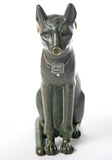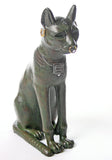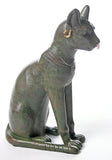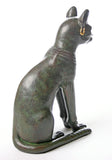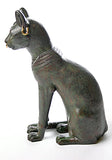Bastet Egyptian Cat Statue Museum Replica Gayer-Anderson 10H
PN# EG01Reproduction of an ancient Egyptian Cat Statue, named the Gayer-Anderson Cat after the collector, after an original in the British Museum, London. Egyptian Cat has a bronze patina, actual earrings and nose ring, with a refined beauty of a museum reproduction.
- Made from resin with meticulous details, and measures 10 in H x 6 in W x 4 in D. Weight 5 lbs.
- Part of the Parastone Museum Collection (Mouseion 3D). PN EG01
- Color description card.
The Cat in Egyptian Mythology
Although other goddesses also sometimes manifested themselves as cats, Bastet is seen as the principal cat goddess. In the complex Egyptian pantheon, Osiris and Isis' daughter formed a trinity with Hathor and the vengeful Sekhmet, both negatives to Bastet's positive. Bastet was attributed to have the power to invoke solar and lunar eclipses. She was associated with fertility through the cycles of the moon. Celebrations in her honor were so ecstatic that she was also worshiped as the goddess of song, dance, and music.
The Gayer-Anderson Cat (approx. 600 BC)
The Gayer-Anderson cat was named after the British Officer and collector who donated this bronze sculpture to the British Museum in 1947. The cat was probably found in Saggara or Giza at one of the animal cemeteries and dates back to the 26th Dynasty (664-525 BC). The cat's forehead is adorned by a winged scarab, a manifestation of the god Khepri and a symbol of the morning sun and rebirth. The necklace bears the silver Udjat amulet, also known as the eye of Horus, which consists of a human eye with an eyebrow and the feathers of a falcon. This eye constitutes a powerful religious symbol and occurs in various Egyptian myths. The principal of which relates how the god Horus' eye was torn out in a battle for the throne with his uncle Seth. The wise moon God Thoth restored the eye, which became a symbol of healing power and happiness. Under the eye of Horus, a winged scarab with falcon's wings has been engraved and above it a sun inlaid in silver. The conspicuous, gold nose and earrings originally occurred on many Egyptian cat statuettes, but they were only seldom found.






